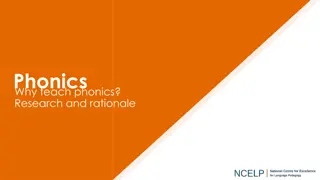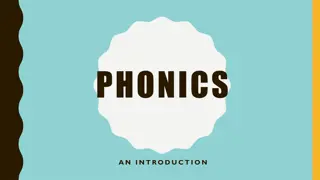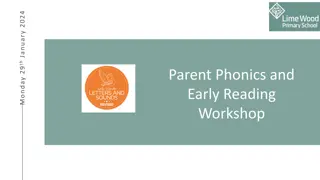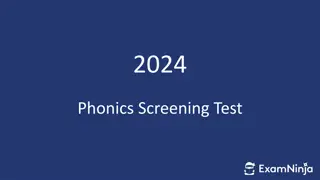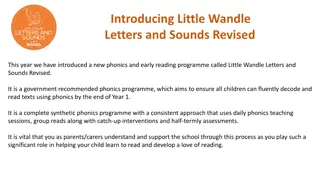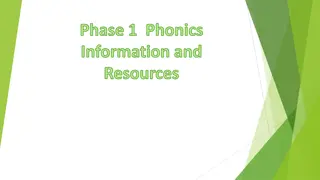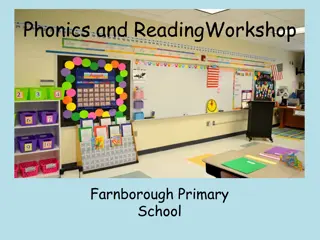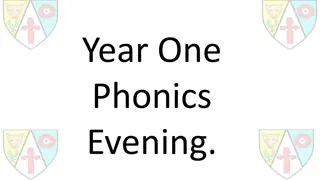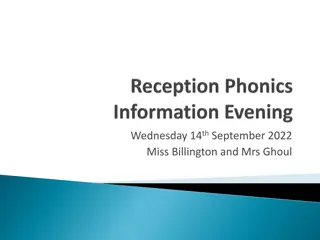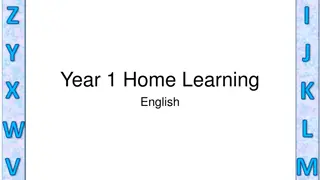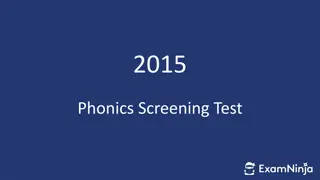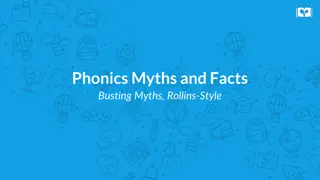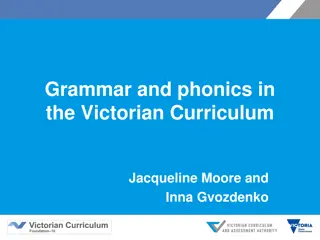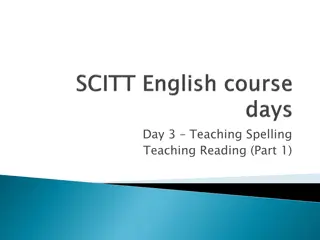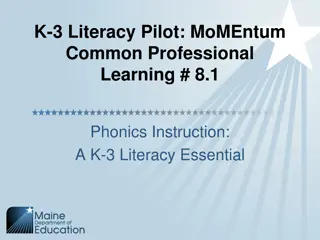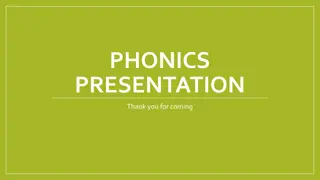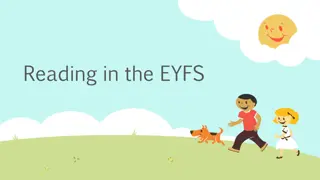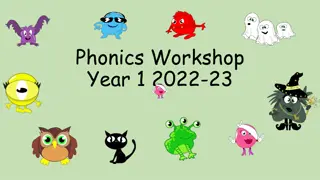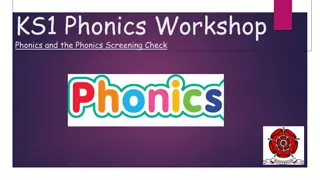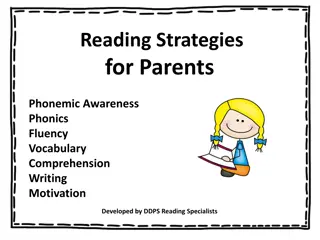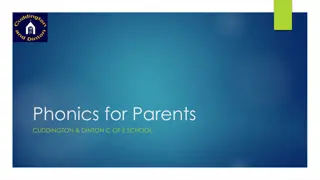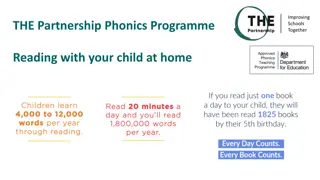Little Wandle Phonics Programme for Early Reading Success
Little Wandle Letters and Sounds Revised is a government-recommended phonics programme aimed at ensuring children can fluently decode and read using phonics by the end of Year 1. With daily phonics teaching, group reading, interventions, and assessments, parents play a crucial role in supporting their child's reading journey. Research shows that early fluency in reading correlates with future academic success, making phonics decoding vital. The programme covers concepts like phonemes, graphemes, blending, tricky words, and more. Visit the school website for programme progression.
Download Presentation

Please find below an Image/Link to download the presentation.
The content on the website is provided AS IS for your information and personal use only. It may not be sold, licensed, or shared on other websites without obtaining consent from the author.If you encounter any issues during the download, it is possible that the publisher has removed the file from their server.
You are allowed to download the files provided on this website for personal or commercial use, subject to the condition that they are used lawfully. All files are the property of their respective owners.
The content on the website is provided AS IS for your information and personal use only. It may not be sold, licensed, or shared on other websites without obtaining consent from the author.
E N D
Presentation Transcript
Introducing Little Wandle Letters and Sounds Revised This year we have introduced a new phonics and early reading programme called Little Wandle Letters and Sounds Revised. It is a government recommended phonics programme, which aims to ensure all children can fluently decode and read texts using phonics by the end of Year 1. It is a complete synthetic phonics programme with a consistent approach that uses daily phonics teaching sessions, group reads along with catch-up interventions and half-termly assessments. It is vital that you as parents/carers understand and support the school through this process as you play such a significant role in helping your child learn to read and develop a love of reading.
Research has shown that being able to read fluently by the age of 6 has a strong correlation with future academic success. If children can read fluently, they are better able to access all areas of the curriculum. If we learn to read, we can read to learn. Decoding using phonics is the most reliable method to work out unknown words which is why automatic decoding is the ultimate aim of the programme.
Phoneme The smallest unit of sound that can be identified in words. Grapheme A letter or group of letters used to represent a particular phoneme when writing. Digraph Two letters that make one sound (phoneme) e.g. sh shop Trigraph Three letters that make one sound (phoneme) e.g. igh light Split vowel digraph A vowel sound where its two letters are split by a consonant e.g. a_e make
Blending Some children learn to blend really quickly, and others take a little longer. Information video link: https://www.littlewandlelettersandsounds.org.uk/resources/for- parents/
Tricky words Tricky words High-frequency words that, although decodable in themselves, cannot be decoded by children using the GPCs they have been taught up to that point. Examples: the go we of
Programme progression On the school website
Daily phonics sessions Revisit and review: The children will revise previous learning by recapping known phonemes, words and tricky words. Teach and practise: New phonemes, words and tricky words will be taught. The children will practise the new learning by blending to read words. Four new phonemes a week with a review on Fridays. Practise and apply: The children will apply their new learning by reading and/or writing words and sentences. Assess and review every 6 weeks
What has changed? What has changed? Children will be expected to use phonics only to work out unknown words and must not be encouraged to guess or work out the word using other cues such as pictures. In school, children will only be expected to read independently books that they can read at 90% fluency, this means that they only have to decode 1 word out of every 10. At home, children will only be expected to read books that they can read with 90-95% fluency. These books will only contain graphemes and tricky words that they have already been taught.
Reading Practice Sessions Reading Practice Sessions Children will take part in three Reading Practice Sessions per week during which they will practise decoding, prosody and comprehension skills with a teacher or TA in a small group. The first time we work on decoding (sounding out) the words. The second time we work on prosody which is reading with expression making the book sound more interesting with our storyteller voice or our David Attenborough voice. The third time we look at comprehension. We read the books three times at school because we want to develop the fluency. The more children see words, the more they begin to read them automatically without having to sound them out.
Supporting your childs reading at home Supporting your child s reading at home Practice reading book: ebook The book that they have been reading in these sessions will be sent home as an ebook on a Friday to read throughout the week at home. Practice reading book Children will also be given another fully decodable book matched to their secure phonic knowledge each week. Library book reading for pleasure Children will also have a weekly library book for you to share and read to them. Book bands?
Supporting your childs reading at home Supporting your child s reading at home It may seem that the book your child has been given is too easy but the whole point is for them to develop their fluency and confidence using the graphemes and tricky words that they have been taught. Your child should be able to read the practice book with developing confidence and fluency without any significant help. The front page helps you to know which phonemes and words are within the book. Your role is to listen with interest and, most importantly, to encourage and praise, enthusiastically acknowledging the child s achievement (even if, at the early stages, this is only small). After the child has read the book, it may be helpful to talk about the book (using the back page as a prompt), but only so far as the child is interested. It is vital that you keep the reading experience positive and avoid turning it into a test. Book bands: we will no longer use these to assign books. The books that children take home will be matched to their secure phonic knowledge.
Reading Logs Reading Logs Please continue to comment and/or sign in your child s Reading Log. This can be any book your child has enjoyed reading or listening to. We will continue our 5 Star Reader system. Teachers and Teaching Assistants trained in the programme will listen to children read three times a week and write in their Reading Log once a week.
In summary There are two types of reading book that your child may bring home: 1) Reading Practice Book (ebook and book): This will be at the correct phonic stage for your child. They should be able to read this fluently and independently. 2) Sharing Book: Your child will not be able to read this on their own. This book is for you both to read and enjoy together.
Reading Practice Book Reading Practice Book This book has been carefully matched to your child s current reading level. If your child is reading it with little help, please don t worry that it s too easy your child needs to develop fluency and confidence in reading. Listen to them read the book. Remember to give them lots of praise celebrate their success! If they can t read a word, read it to them. After they have finished, talk about the book together.
Sharing Book Sharing Book In order to encourage your child to become a lifelong reader, it is important that they learn to read for pleasure. The sharing book is a book they have chosen for you to enjoy together. Please remember that you shouldn t expect your child to read this alone. Read it to or with them. Discuss the pictures, enjoy the story, predict what might happen next, use different voices for the characters, explore the facts in a non-fiction book. The main thing is that you have fun!
Further support Further support https://www.littlewandlelettersandsounds. org.uk/resources/for-parents/ The school website has the Little Wandle link, further information and resource sheets.


